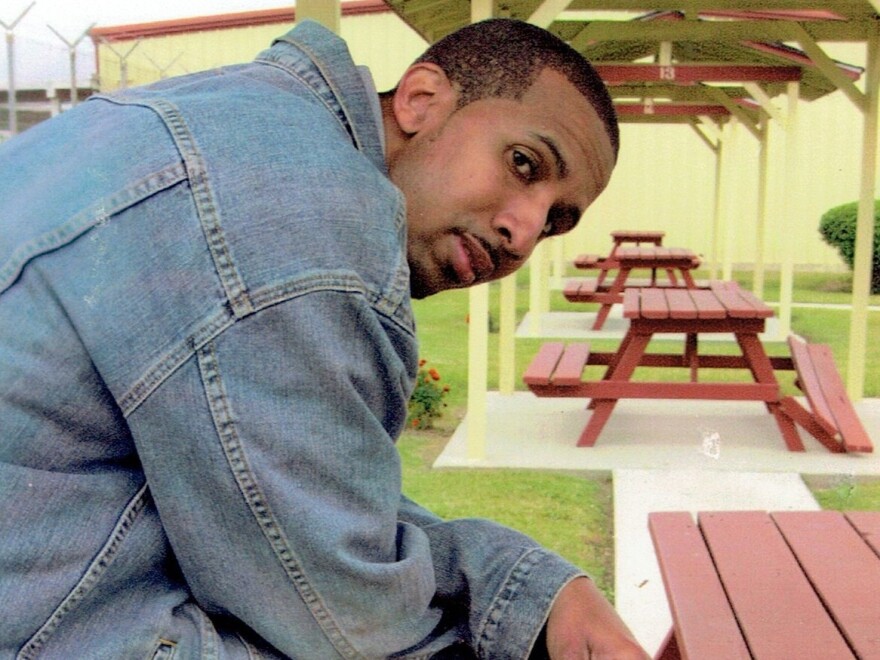Mac Phipps, the New Orleans-area rapper who has been in prison since being convicted on charges of manslaughter in 2001, was recommended for clemency this week. The recommendation for immediate parole by the Louisiana Board of Pardons and Committee on Parole puts the rapper, who has maintained his insistence that he is innocent of the crime he was accused of, one step closer to freedom.
Delivered in a remote hearing over Zoom on Monday, Feb. 22, the board's unanimous vote does not overturn Phipps' conviction or argue his innocence; rather, it recommends early release in light of the rapper's time served and good behavior while incarcerated. His case now goes to Louisiana Gov. John Bel Edwards for review. The news comes two decades into a 30-year sentence, which began after a contentious trial in which Phipps' song lyrics became a central tool of the prosecution's case to incriminate him.
A spokesperson for Gov. Edwards told NPR, "Mr. Phipps' application has not been forwarded to [the] Governor's office and as such the Governor is unable to comment about a clemency application he has not yet reviewed." The spokesperson did add that Edwards has approved 273 clemency requests in just over four years in office. (By comparison, his immediate predecessor approved just three such requests in eight years as governor.) If Gov. Edwards grants clemency, Phipps will then be given a parole hearing, and if released will spend 10 years on parole.
Born McKinley Phipps Jr., Mac Phipps began rapping at an early age, dropping his debut album at 13. A local favorite, the hip-hop prodigy eventually signed with one of the most consequential rap labels of the 1990s, Master P's No Limit Records. With that change came an image adjustment: Phipps' early work had been self-identified "conscious" rap, introspective and lyric-driven, but after signing with the more street-oriented label he adopted an explicitly gangsta persona and rebranded with the nickname The Camouflage Assassin. He released two albums with No Limit.
In February 2000, Phipps was at Club Mercedes in Slidell, La., for a performance when gunfire rang out in the room. In the ensuing panic, he regrouped with the family members who had accompanied him to the show and drove home to Baton Rouge, but late that night, police arrived to arrest Phipps in connection with the shooting death of 19-year-old Barron Victor Jr. The rapper was ultimately charged and, in 2001, convicted of manslaughter.
The artist had no previous criminal record, and as his defense argued, no physical evidence linked Phipps to the shooting. Perhaps more notably, days after the arrest, a man named Thomas Williams — a member of Phipps' entourage who had been working security at the club that night — visited local police and confessed that he, not Phipps, had shot Victor. As NPR's Louder Than A Riot podcast reported on Phipps in 2020, the prosecution's case leaned heavily on the rapper's Camouflage Assassin persona, citing lyrics from his songs that described violent acts as indicative of his capacity to commit murder.
"This guy shouldn't be incarcerated. And I know that his music got him incarcerated. But they got the wrong guy," Phipps' former label head, Master P, told Louder Than A Riot in an interview recorded last year. "I mean, when you talk about 'assassin,' we talking about verbalassassin. We talking about how he killed people with his lyrics. And I think the system mixed that up with what he is as an entertainer."
Even in his clemency hearing on Monday, Phipps' relationship with hip-hop was a point of questioning. Tony Marabella, one of the pardon board members, asked Phipps if he was planning to return to rap once he's released: "That business that you're in has a flair for getting people into trouble or at least getting them put under suspicion. Do you follow what I'm saying?"
In his response, Phipps shied away from the spotlight that had been used against him two decades prior. "I think at 43 years old, my approach to that business is pretty different," he said. "My capacity is probably more on the musical side of it, rather than just, you know, being out front and entertaining. I think I've gotten a little too old to be the out-front man at this point." He added that he may not go back to music at all, saying he'd like to make use of the HVAC degree he obtained while in prison, as well as help out with his parents' visual art business.
Clemency from the governor would not exonerate Phipps, but his attorney is preparing for another legal move that could potentially reverse his conviction, based on a separate issue during his 2001 trial.
Phipps was convicted by a non-unanimous jury, which the U.S. Supreme Court recently ruled unconstitutional in the United States. (At the time, Louisiana was one of only two states to allow non-unanimous decisions.) This year, the Supreme Court will decide whether that ruling will apply retroactively to older cases like Phipps', too.
Pending that result, Phipps' lawyer Stanton Jones plans to petition the Louisiana courts to throw out his case altogether. If Jones is successful, Phipps' original felony conviction would be invalidated, rendering clemency and parole a moot point. Mac Phipps would be a free man.
Louder Than A Riot hosts Sidney Madden and Rodney Carmichael joined Ari Shapiro to discuss the greater significance of Mac Phipps' story on All Things Considered. Hear their full conversation at the audio link.
Copyright 2021 NPR. To see more, visit https://www.npr.org. 9(MDAxNzg0MDExMDEyMTYyMjc1MDE3NGVmMw004))









